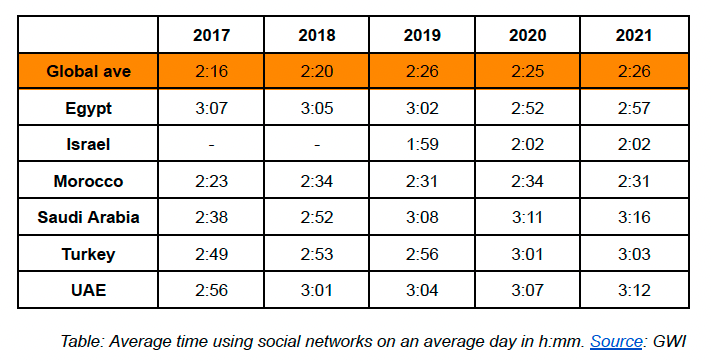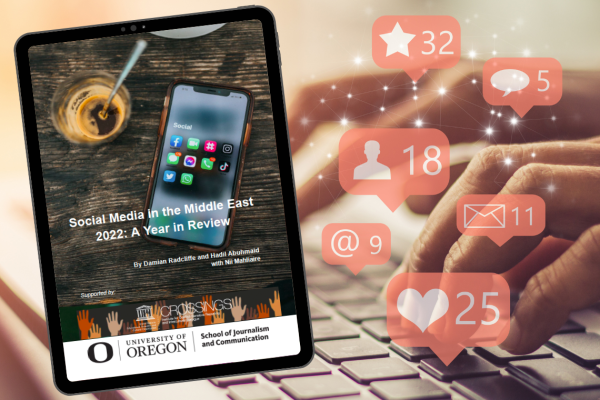University of Oregon – UNESCO Crossings Institute report sheds light on social media use in the Middle East and North Africa
The Middle East and North Africa (MENA) region continues to be a market leader for social media with platforms increasingly playing an important role in politics. These are some of the key findings in Social Media in the Middle East 2022: A Year in Review, the latest report published by the University of Oregon-UNESCO Crossings Institute.
The extensive study examining social media trends in the Middle East during 2022 is the 11th in a series of annual reports that started back in 2012. As with previous studies, information was sourced from over 100 different online sources, in English and Arabic, including research reports, media coverage, interviews and articles.
The report was authored by Damian Radcliffe, journalist, researcher and professor based at the University of Oregon; Hadil Abuhmaid, Media Studies Doctoral Candidate at the University of Oregon, and Nii Mahliaire, a Ph.D. Candidate in Communication and Media Studies at the University of Oregon.
The study explores the most popular social media platforms and how people are using them, looking at the impact of the likes of Twitter, Instagram and Facebook on politics, business and culture in the region. The report provides invaluable insights into how social media shapes the way people connect with one another and how we consume and find information.
This year’s report revealed three clear themes: The MENA region is a market leader for social media use on multiple platforms; there are growing issues related to freedom of expression; and the fact that social media played a big role in the 2022 Iran protests.
“None of these are new developments – social media has also played a role in previous protests across Iran – but these trendlines have become more pronounced in the past year,” the report points out.
Damian Radcliffe will lead various fireside chats on audience engagement, journalism and media entrepreneurship at the FIPP World Media Congress 2023, taking place from 6-8 June in Cascais, Portugal.
See the agenda for Day 1 and Day 2. Get your tickets here.
Leading the way
Over the past decade, there has seen a significant increase in social media adoption in the Middle East. The region now boasts some of the highest penetration rates of social media in the world, making it a crucial market for platforms and businesses looking to reach Arab audiences.
The report shows that five MENA nations are in the top 10 for take-up of social networks, with The United Arab Emirates (UAE), Bahrain and Qatar having the highest levels of adoption in the world, according to DataReportal.
Globally, social media usage remains at 2019 levels, apart from the Middle East and Africa region, with GlobalWebIndex showing users are often on social media for more than three hours a day.

The Top 5 countries in the world for reach on YouTube are all in the MENA region, with Lebanon leading the way, followed by Bahrain, Oman, Qatar and UAE. The region also loves TikTok, with the five spots for the app (by reach) all held by Middle East nations – UAE, Saudi Arabia, Kuwait, Qatar and Iraq.
And of the top 16 nations in the world using Snapchat, nine are in MENA, with Bahrain having the highest reach (79.8%) of any national market in the world.
When it comes to Facebook globally, Libya has the largest reach, with 96.1% of those aged 13+ using the social network. Meanwhile, four MENA nations are in the Top 20 for reach on Instagram, while Turkey is now the 5th largest market for the platform, globally, with nearly 49m users.
Three countries in MENA are in the Top 20 markets for Twitter; and in terms of market share, the region has five spots in the Top 20.
According to the study there are several factors driving social media habits in the Middle East, including high levels of smartphone adoption and mobile internet speeds. Data for December 2022 from Ookla, ranked Qatar and then UAE as the fastest markets in the world for mobile. The UAE was also ranked fourth for fixed broadband.
Free speech concerns
The study shows that one of the biggest trends in 2022 was the multiple efforts to stifle freedom of expression and free speech on social media in the MENA region.
Amnesty International says at least 75 people are in jail in at least four countries in the Gulf Cooperation Council (GCC) in what they refer to as a violation of the right to freedom of expression, association, or peaceful assembly.
“Governments in Saudi Arabia, the UAE and Bahrain repeatedly repress dissent while investing heavily in rebranding themselves as rights-respecting states,” said Amna Guellali, Amnesty International’s Deputy Director for Middle East and North Africa.
“Sport fans should pause for thought and consider the dozens of people languishing behind bars in GCC countries simply for exercising basic rights and call for their release.”
According to a report by the Australian Strategic Policy Institute (ASPI), Russia, Iran, and Saudi Arabia are the three most “prolific perpetrators” of state-linked disinformation on social media.
“Our analysis demonstrates that there is a proliferation of state actors willing to deploy information operations targeting their own domestic populations, as well as those of their adversaries,” wrote the authors of the study, which was accompanied by a website that provided analysis on 17 countries with accounts taken down by Twitter over recent years.
Iran imposed a near blackout of social media platforms such as Twitter following an outburst of anti-government protests across the country.
According to CNN, a fierce battle to control the narrative is now being fought online “where supporters and opponents of the government alike are taking to social media to tell their version of the truth and, in some cases, go beyond the truth.”
The scourge of Fake News
Like with other areas around the world, misinformation continues to plague online consumers in the MENA region.
The University of Oregon-UNESCO Crossings Institute report references a Politico article that argues social media platforms like Facebook and Twitter make little effort in enforcing rules that restrict misinformation and politically divisive information in Arabic-language social media.
“Suspected Kremlin agents peddle falsehoods masquerading as Instagram models,” the article states. “The terrorist organisation Hezbollah posts propaganda updates as if it were a news organisation. More than 2 million Iraqis join Facebook groups where guns are bought and sold without checks.
“Welcome to the world of Arabic-language social media — a Wild West where content moderation is minimal, foreign governments act with abandon, and jihadists foster online hate in arguably some of the world’s most war-torn countries.”
These claims are based on an analysis by Digital Bridge, Politico’s transatlantic tech newsletter, which highlighted issues such as “state-backed falsehoods,” lack of monitoring and disparities between how tech giants are addressing misinformation in major western markets and other parts of the world.
Meanwhile, Meta determined that the U.S. military was behind a coordinated campaign that targeted several Middle Eastern countries including Algeria, Iran, Iraq, and Syria, with Facebook reporting it removed 39 accounts, 16 pages, and two groups and 26 accounts on Instagram for their “coordinated inauthentic behaviour.”
In total, Meta found about 22,000 accounts followed on one or more of these pages, approximately 400 joined at least one of those groups, and around 12,000 accounts followed one or more of the Instagram accounts.











